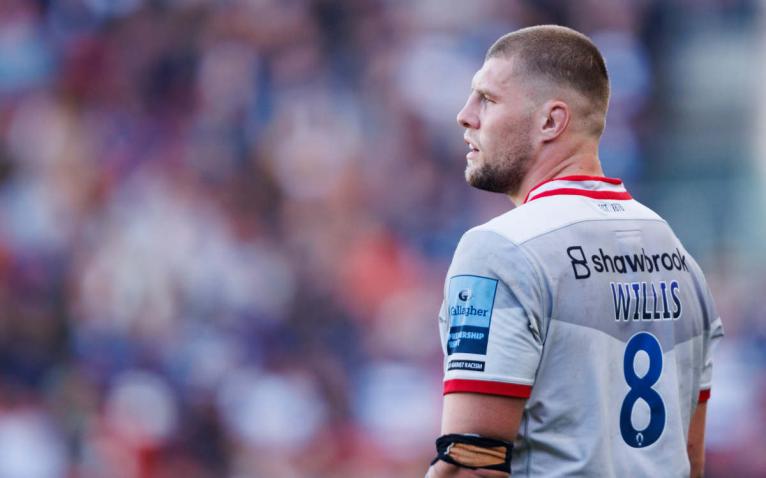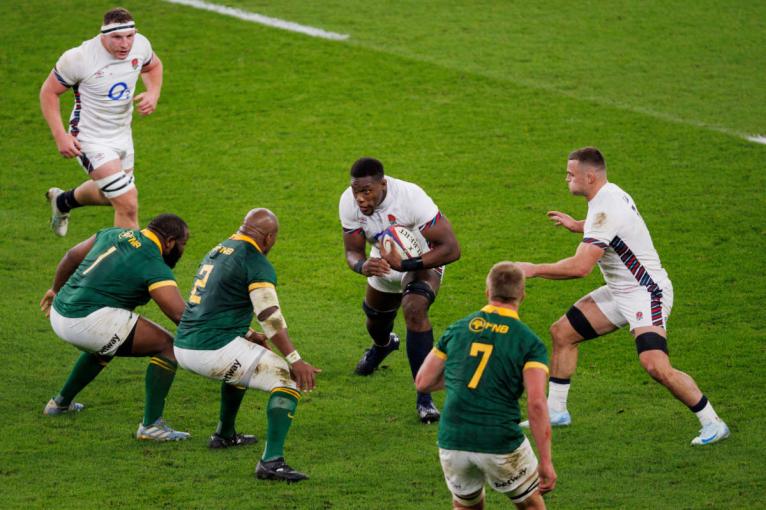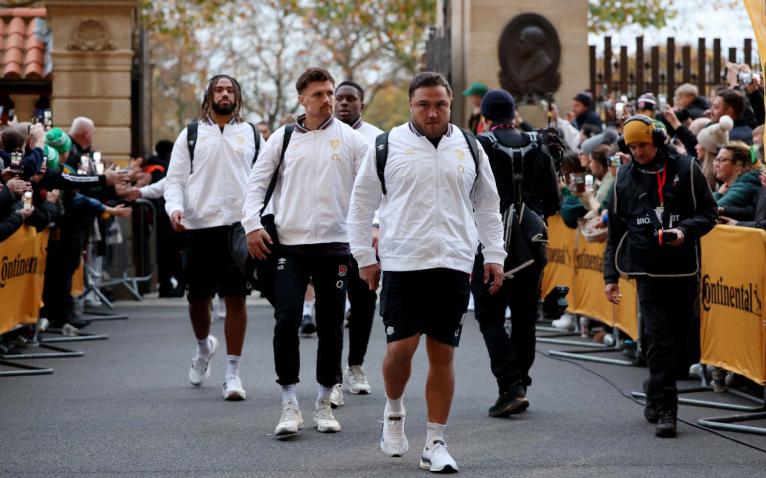In the Teenage Kicks era of Luke Littler it may feel strange to salute a Brave New England world by dint of a 30 year-old but that’s how the appointment of Maro Itoje as captain feels; a break with the past, a nod to the future, a sense of possibility. Lord knows, English rugby is badly in need of a pick-me-up. The mood music surrounding the game has been a screech-fest, a wailing dirge of RFU-composed rancour. There has also been the less than flattering accompaniment of a shabby playing record over the last 12 months.
Yes, I know, that’s quite a lot to load on those Itoje shoulders, no matter how broad they might be. But that’s where Steve Borthwick and England are, fighting on the field first and foremost for credibility but also with a lousy PR profile as a backdrop.
Fair play to Borthwick, not the most naturally happy-clappy sort nor not normally inclined to take too much notice of the white noise from outside. His mind is focused primarily on what happens on the pitch and that is as it should be. But those England followers suffering in the stands and suburbs are craving a fillip, something to look forward to. And this squad, with Premiership man-of-the-moment, Tom Willis, rightly selected and a bit of zip to cherish out wide, offers that. There may be no place – yet – for Northampton wunderkind, flanker Henry Pollock, but back-row is not an under-resourced area for England. A rear five Itoje, George Martin, Ollie Chessum, Willis and Ben Earl on the flank is none too shabby.

It is time for a new departure although Borthwick will correctly point out that continuity is to be valued. But there has to be more of a feel of England being on top of matters, of being proactive in how they go about their business, of forging an identity that they can take into the two year countdown to the next Rugby World Cup. Itoje is to lead the way towards that event in Australia, taking hold of the baton that has been passed his way, despondently maybe but with good grace nonetheless, by Saracens’ teammate, Jamie George.
The Saracens’ hooker has played his part, fiercely, cleverly, selflessly, in transitioning the team post the Owen Farrell era. The scores on the doors may not read too favourably with only five wins in 12 matches but George brought a sense of stability to England affairs. And before we fall into the patronising trap of portraying him as no more than a good bloke – which he is – George has also done his basics well, particularly in regard to that Littler-like trade of landing his arrows in the slot at the lineout. But all that invariably comes to an end after 50 minutes when the signal goes out and he gives way to Luke Cowan-Dickie or Theo Dan.
Itoje does not possess the brooding, intimidatory front of a Martin Johnson or the bristling defiance of a Martin Johnson but he does share the sense that he is an implacable presence on the rugby field.
Itoje is a more complete figure, there from first whistle to last, in position to scrap and battle as his wont but also, crucially, to direct. England have made a pig’s ear of the last quarter, of not getting on the right side of the scoreboard in tight matches. Itoje may not yet have a Mike Brearley-like capacity to find this or that nuance out on the playing field as once the Middlesex cricketer did for England, drawing so much from those around him (which is another England failing that needs addressing) but he has the potential to do so if for no other reason at the moment that he is a guaranteed 80-minute player.
Itoje has it within his grasp to do for England what John Eales did for Australia. Just like that great Wallaby who lifted the World Cup in 1999 and who ruled the roost across a decade, Itoje does not possess the brooding, intimidatory front of a Martin Johnson or the bristling defiance of a Martin Johnson but he does share the sense that he is an implacable presence on the rugby field. Like Eales, he creates his own aura, one of athletic dominance, with his mastery of the fundamentals and an ability to be a pest at the breakdown. In short, he leads by example rather than by chest-thumping rhetoric.

Eddie Jones never rated his leadership qualities believing him to be too self-contained, The Australian had many attributes as a coach but his assessments of a player’s intrinsic worth was not one of them. He saw what he saw and that was it, like it or lump it. Bob Dwyer and Rod Macqueen recognised what they had in Eales and now Borthwick has entrusted Itoje to bring those self-same things to the fore for England. (Eales was also a very credible test-level goal-kicker, once winning a Bledisloe Cup at the death with a nerveless kick but we’ll spare Itoje that extra burden).
Itoje is in at the deep end. England’s start to their Six Nations campaign would have strong men reaching for the tranquilisers with an away fixture in Dublin followed by a France side coming to Twickenham hell-bent on actually winning some silverware rather than being merely bigged up. Of course, what appears challenging on paper should be viewed by Itoje as a glorious opportunity. What better way to launch a new era than with commanding performances against higher-ranked teams.
Itoje’s first task is to nail that troublesome last quarter, part body-fatigue, part brain-fade.
Does Itoje have the cattle for an English stampede across the opening rounds of the tournament? Well, you’d be hard pushed to make too many extravagant claims on their behalf given their underwhelming record in the autumn. They may not be far off but until they overcome that inability to close out the deal, then doubts remain. That is Itoje’s first task, to nail that troublesome last quarter, part body-fatigue, part brain-fade. Perhaps blitz defence duties left them gasping for air. More likely, England panic, a sub-conscious ailment that strong leadership can rectify.
As for matters of personnel, that back five mentioned above has to start. England are underwhelming in the front-row, certainly in terms of depth, and they will have to deal with that. The pack, though, can punch to its weight, especially if Chessum is fit and raring to go.

Alex Mitchell’s return to the fold is a boon. He is head and shoulders ahead of the scrum-half pack and will allow England to play with quick ball and varied options at the base. The Smith-Smith conundrum will be a constant. The Marcus at full-back scenario is only for emergency or late-match occasions. The Harlequin is the man in possession and that is enough to keep him as the starting no.10, strongly pressed by Fin Smith.
The midfield is the bane of England’s life and has been through several generations. It is the weak link and might scupper any lofty aspirations. The blitz defence has, quite sensibly, been put in cold storage, thereby lessening Henry Slade’s worth. Ollie Lawrence deserves a run at outside centre with Fraser Dingwall having a crack in the no.12 shirt. Until England unearth or develop a midfield combination to match those of Ireland or Scotland, or many other of the leading lights, then they will struggle to go toe-to-toe on equal terms with the big boys of the global game. It is their Achilles heel.
Borthwick has made the right noises. Now it is time for delivery.
The sooner George Furbank is back in harness at the rear the better. Until then, a rejuvenated Freddie Steward, can obviously play a role although Borthwick himself has highlighted that he wants this England to be ‘a team of pace.’
Borthwick has made the right noises. Now it is time for delivery.


Why did England let Fergus Burke go to Scotland he was with the Crusaders and with Saracens he could have been the better player than Smith or Farrell 😂
It's a nuanced article by Clearey, the simple fact is that your captain has to pick himself and as clearey alludes to, must do 80mins.
Englands 2 main areas of relative weakness are front row and centre.
Ireland, France and Scotland all have better balanced squads through the critical spine positions.
I can't see England finishing any better than 3rd this yr.
Yes or no answer.
Is Oghenemaro going to kick for posts?
I like some of the selections in this squad and Itoje is the right man for the job.. but I wouldn't call it a break with the past. Borthers and Wigglesworth appointing another Saracens stalwart as captain doesn't strike me as a sign of innovation. I fully expect more of the same.